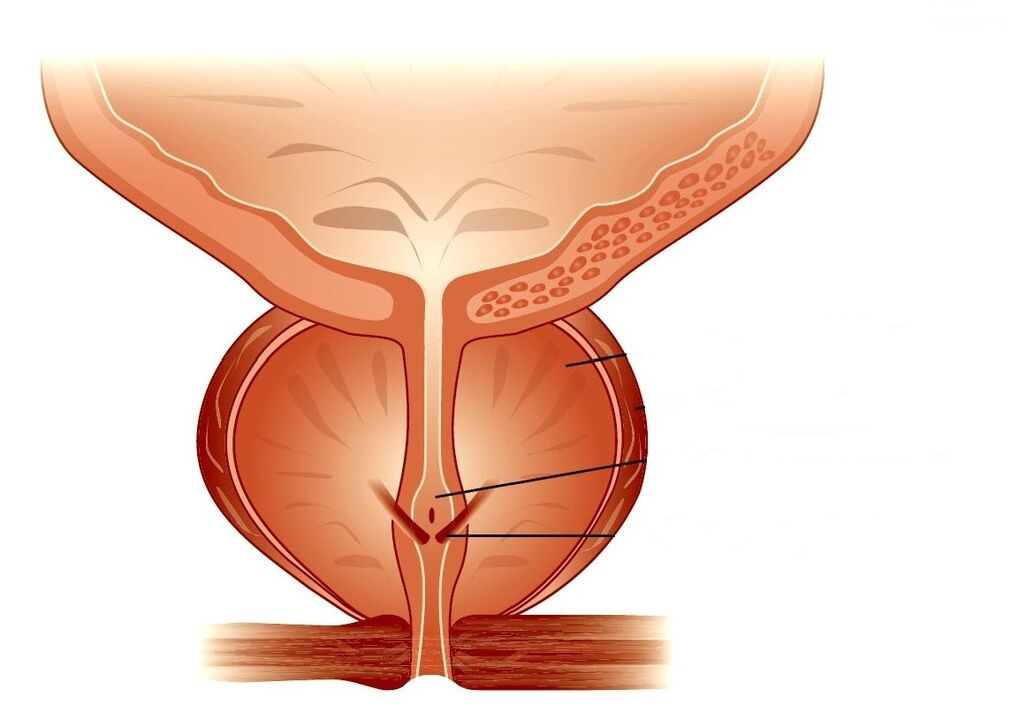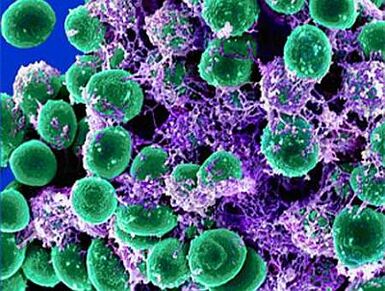What is chronic prostatitis? First of all, you need to understand what the prostate is, it is also the prostate. This is an organ that only men have in their body, it develops during fetal development and survives for the rest of its life. The prostate is a gland of external secretion, ie. he develops his secret and reveals it.
Due to its location, it is not visible from the outside, because. found in the pelvis in men. It is a rounded formation, located below the bladder, and at the same time located near the muscles of the pelvic floor, rectum, ureter, urethra and vascular and nerve plexuses of the small pelvis. Since this organ is an exocrine gland, it is necessary to understand what functions it performs. First of all, it produces a secretion, which is one of the important components of sperm in men. This secret contains a lot of protein, amino acids, etc.
Unfortunately, both men and doctors pay little attention to the prostate.
So what is prostatitis, especially chronic prostatitis

This is an inflammatory disease of the prostate. This inflammation can be acute or chronic.
No chronic disease begins spontaneously, it is always preceded by some degree of acute inflammation.
In some cases, a person may not notice the appearance of the disease, but it will exist for a long time and remain untreated, and then lead to serious morphological and functional disorders.
Chronic prostatitis usually develops at least three months after acute inflammation of the prostate.
As a result of this inflammation, the morphology of the cell composition is disturbed, and the functions in the prostate also suffer.Epidemiology

This disease is one of the most common inflammatory diseases in men. The disease is quite young, ie men of different age categories are susceptible to it. If prostate adenoma occurs more often in old age, then chronic prostatitis can occur in men as young as 20 years of age. The average age at which the symptoms of this disease are detected is 40-50 years.
By old age, almost every man had contracted this disease, but many of them could not even treat it and did not go to the doctor with complaints about the appearance of certain symptoms.
At the same time, in chronic prostatitis, the symptoms may not be detected immediately, and the man may turn to other problems that he thinks are more serious. And only before the treatment of another disease is the initial cause revealed. If the wrong treatment is given in case of acute inflammation, chronic prostatitis is inevitable.
Causes of chronic prostatitis
First of all, when determining the cause of the development of inflammation in the prostate, it is necessary to determine the predisposing factors. There are many of them and they are very common in the modern world.
These are primarily infectious agents. The most common cause is microbial etiology. A microbial infection can be either nonspecific or carry a specific pathogen. Specific agents include sexually transmitted infections. And since many of these infections can be completely asymptomatic in men, they can last a long time in the body. Even a seemingly unexplained chronic infection can lead to prostatitis.
The appearance of non-specific pathogens in the causative factors may be due to non-compliance with the rules of personal hygiene, infrequent washing of the head of the penis and after urination and a short time after sexual intercourse.
In some cases, vaginal dysbiosis in a partner, or some of the woman's opportunistic pathogens, play a major role in the development of prostate inflammation in men.
Among the most common causes are: chlamydia, trichomonads, gonococci, gardnerella, E. coli, staphylococci and enterococci.
Remember the likelihood of the participation of viruses and fungi

In this case, the pathogen enters the body in an ascending way, ie. through the urethra.
In addition, there is another important way of penetrating an infectious agent - hematogenous. Many men have some kind of inflammatory disease, sometimes the flu or SARS can cause an inflammatory process.
Hypothermia, reduced immunity, and even overheating on the background of an infection that is already present in the body can also cause the development of inflammation.
Sexual behavior also plays an important role in the development of an inflammatory reaction. In this case, prolonged sexual abstinence negatively affects the state of the gland, contributes to stagnation of blood in the pelvic organs, impaired blood supply and slows blood perfusion of organs.
Interrupted sexual intercourse, incomplete ejaculation leads to stagnation of secretions in the organ, as well as overcrowded, enlarged organ affects the blood supply processes, and can even cause mild swelling of the surrounding tissues. In rare cases, the disease is immune in nature. Autoimmune factor is not excluded. Chronic somatic infection should also be ruled out.
Symptoms and treatment of chronic prostatitis
Symptoms of chronic prostatitis in many men may not be present at all. Some may not even be able to pinpoint one or another predisposing factor. However, there are many symptoms of this disease. The most popular of these is pain. The pain syndrome can be quite long, sometimes months.
The pain is often not localized in a particular place. It usually has a diffuse character, with a tendency to radiate to the lower back, perineum, scrotum, inguinal region. But by no means are they in place. They are most often traction and pain, the pain is not permanent. They tend to increase or decrease depending on the state of the organism and the influence of environmental factors.
Another important sign is violations in the sexual sphere. Men can often complain of erectile dysfunction, it can be almost imperceptible at first, and it comes much later in the later stages, even when they are exposed to all predisposing factors.
But with chronic prostatitis, there is never complete impotence. Like ejaculation. In the beginning, it can happen much faster than planned, and in the later phase, on the contrary, it slows down, almost to a complete cessation. Orgasm becomes less alive and emotionally pronounced. Sometimes sexual problems can affect a partner. A very common cause after which men are diagnosed with chronic prostatitis is infertility.
Also, quite often men can have problems urinating. It becomes fast, sometimes reminiscent of the signs of cystitis. The imperative need to urinate can upset a man at night. Sometimes they are accompanied by pain, cramps, etc. A man can detect the symptoms of chronic prostatitis on his own.
How to diagnose chronic prostatitis in time and start urgent and effective treatment?
It does not usually cause difficulties among experts in this field. When a man comes in contact with any symptoms, the doctor can make this diagnosis without further examination.
Usually, the minimum examination is limited to taking anamnesis, laboratory tests and digital rectal examination. Digital rectal examination does not require additional preparation for a man. The doctor can determine the size of the prostate, its consistency, pain in a particular area.
Laboratory indicators are not limited to a general blood test. Urine analysis is also necessary, in this case it has certain characteristics. One should excrete the last portion of urine, the so-calledterminal, in which the laboratory assistant must determine the number of leukocytes and the presence of bacterial cells. In some cases, the cause has not been found and you must be tested for sexually transmitted infections.
They also take a swab from the urethra. Another very important in the diagnostic plan is ultrasound. It is performed through the rectum using a special sensor. The size of the gland, the presence of scars, tumors, edema, etc. are determined. It is also important to check the blood flow to the organ.
In some severe and asymptomatic cases, an invasive biopsy may be needed.
To rule out cancer, a man can be sent to determine a tumor marker of prostate cancer in the blood. It's called PSA. But you must take it no earlier than 10 days after the digital rectal examination.
Treatment of chronic prostatitis
The sooner treatment for chronic prostatitis is started, the more likely it is that the disease will recover from the chronic form. You should never resort to self-medication, as prostatitis should be treated by a qualified specialist.

Treatment of this pathology is carried out by a urologist. Usually treatment does not require hospitalization. Treatment of all existing chronic diseases is necessary.
First of all, you should start by changing your lifestyle. It is necessary to exclude accidental sexual intercourse, diseases of the partner.
You must follow the rules of personal hygiene. Rinse the glans of the penis thoroughly to prevent bacteria from accumulating under the foreskin. Sex life should be regular, with full ejaculation. Coitus interruptus should be avoided.
In addition, physical activity should be increased. Move more often to prevent blood stagnation in the pelvis and prostate.
The diet also needs to be adjusted. Try to avoid the use of fast food, spicy, smoked and salty. Sweets should also be limited. Alcohol and drugs should be completely avoided. Men should also stop smoking.
Treatment of prostatitis is also divided into medical and surgical. First of all, with chronic prostatitis, they begin to treat, of course, the cause. And since it is most often contagious, antibiotics are the main drug. His choice primarily depends on the pathogen that was discovered during the diagnosis. It is best to immediately determine the sensitivity of the microorganism to antibacterial agents.
Then the treatment will be more efficient and shorter. Antibiotics can be prescribed in different ways. With an asymptomatic course of the process, tablet forms are usually prescribed. If the chronic process worsens, then injectable drugs are resorted to. Treatment for chronic prostatitis may involve several agents at once.
An important component in complex treatment are anti-inflammatory drugs. This is usually a class of nonsteroidal anti-inflammatory drugs. Vasodilators are usually also very necessary, they are used to improve the blood supply to the pelvic organs, restore microcirculation. They prevent congestion.
Another class of agents used are immunomodulators. Vitamin therapy should be included in the complex treatment.
Surgical methods are rarely resorted to, but still sometimes it is the only way out. Among these methods, prostate resection is used. In some cases, it is necessary to surgically treat the resulting complications. This may be an excision of the cyst or the opening of an abscess.
Treatment of chronic prostatitis includes various physiotherapies. In order for a disease such as chronic prostatitis to have a favorable prognosis, the identified disease should be treated immediately. Effectiveness of treatment should be monitored by a specialist after some time.





























